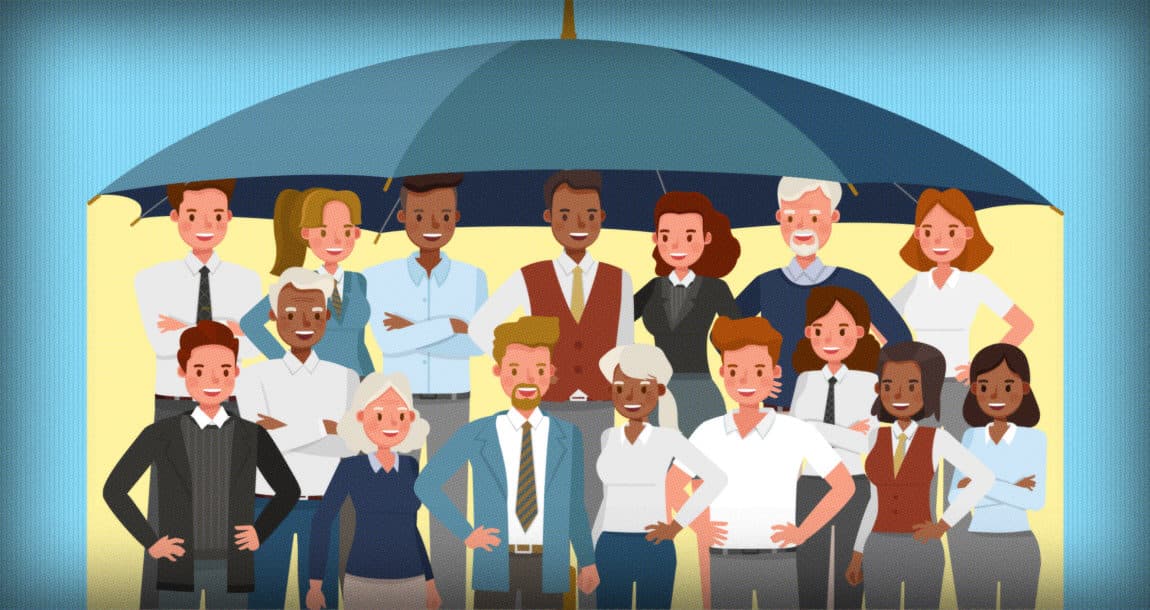Workers Give Employers High Marks On Benefits’ Offerings, EBRI Finds

Seventy-six percent of employees favorably view their employers’ efforts to improve their overall well-being, according to The 2021 Workplace Wellness Survey conducted by the Employee Benefit Research Institute (EBRI) and Greenwald Research.
And over three in 10 (31%) feel their employers’ efforts to improve their overall well-being have increased, which is a modest increase from last year (28%).
“The survey findings demonstrate a relatively high rate of employee satisfaction with their benefits,” noted Lisa Greenwald, CEO of Greenwald Research. “Among the top benefits cited were health insurance and retirement savings plans,” she added.
Health insurance is the benefit employees say contributes the most to their feelings of financial security. Nearly two-thirds of employees say their health insurance “contributes a lot” to their security and trust their health insurer to make good decisions.
Employees (62%) are also very satisfied with their employment-based retirement savings plans. In fact, 60% of them say that their retirement plans continue to be an anchor of financial well-being, which is a 5% increase from 2020.
In addition to health insurance and retirement savings plans, paid time off and leave benefits contributed to employees’ sense of financial security as well. Seventy-seven percent of employers offered paid vacation, two-thirds offered paid sick leave, and 39% offered paid paternity leave.
Sources Of Financial Stress
With employees carrying an average of $26k in non-mortgage debt, most are feeling stressed about their financial future, according to the survey. Nearly half are concerned about their household’s financial well-being, citing saving for retirement and the need to have savings in case of an emergency as top sources of financial stress.
Not surprisingly, 83% of employees are at least somewhat interested in an Emergency Savings Account that would allow them to save money through payroll deduction.
This interest in ESAs is likely driven by one in three employees who feel that they do not have enough savings to handle an emergency. In fact, according to the survey, 54% of employees report that their retirement savings are the only significant emergency savings they have.
Employees’ Concerns
While most of the survey reveals a positive outlook on employers’ benefits initiatives, employees did express declining satisfaction with their work-life balance. Less than half of employees (48%) surveyed say that they are satisfied with their current work-life balance, down from 59% in 2018. Nearly three in ten (28%) say that the importance of paid leave has also increased in the past year.
In particular, six in ten employees say that it’s challenging to balance work and caregiving responsibilities, leading to feelings of stress and not having enough time to spend with loved ones. Only one in three employees are currently offered paid time off for caregiving, even though one in five say more caregiving help would add value to their employers’ benefit offerings.
Even though employees are increasingly grateful for their health insurance benefits, about half of them are worried about their health. Mental-health wellness has become more important, most likely due to the stress of dealing with the impact of Covid-19. “Employees are showing interest in expanded mental-health benefits,” Greenwald pointed out.
Ways To Improve Benefits
Apart from offering more money to employees, what can employers do to improve the benefits they offer? Among other things, Greenwald suggested, they can enhance work-life balance initiatives and add more flexibility to employees’ work schedules. Also, the survey noted, more than eight in 10 employees would likely use a free online program that offers benefit advice.
The survey of 2,016 American workers was conducted online from July 7 to July 27, 2021. A summary of the survey report is available at ebri.org/wws-2021. A future release that examines the sentiments of Black and Hispanic workers will be released in mid-November.
EBRI is a nonprofit research institute that focuses on health, savings, retirement and economic security issues. For more information, go to www.ebri.org. Greenwald Research is a research firm and consulting partner to the health and wealth industries.
Ayo Mseka has more than 30 years of experience reporting on the financial-services industry. She formerly served as Editor-In-Chief of NAIFA’s Advisor Today magazine. Contact her at [email protected].
Ayo Mseka has more than 30 years of experience reporting on the financial services industry. She formerly served as editor-in-chief of NAIFA’s Advisor Today magazine. Contact her at [email protected].






Surviving COVID-19 Could Make Obtaining Life Insurance Complicated
Paying For Health Care: 3 Things Consumers Want
Advisor News
- Affordability on Florida lawmakers’ minds as they return to the state Capitol
- Gen X confident in investment decisions, despite having no plan
- Most Americans optimistic about a financial ‘resolution rebound’ in 2026
- Mitigating recession-based client anxiety
- Terri Kallsen begins board chair role at CFP Board
More Advisor NewsAnnuity News
- Reframing lifetime income as an essential part of retirement planning
- Integrity adds further scale with blockbuster acquisition of AIMCOR
- MetLife Declares First Quarter 2026 Common Stock Dividend
- Using annuities as a legacy tool: The ROP feature
- Jackson Financial Inc. and TPG Inc. Announce Long-Term Strategic Partnership
More Annuity NewsHealth/Employee Benefits News
- Canceled health plans and decreased coverage: Loss of health care subsidies hit hard in southeastern Connecticut
- TRUMP ADMINISTRATION DROPS MEDICAID VACCINE REPORTING REQUIREMENTS
- SLOTKIN, WHITEHOUSE, AND SCHAKOWSKY INTRODUCE PUBLIC HEALTH INSURANCE OPTION LEGISLATION
- Wittman, Kiggans split on subsidies
Wittman, Kiggans split on subsidies
- Wittman, Kiggans split on subsidies
Va. Republicans split over extending health care subsidies
More Health/Employee Benefits NewsLife Insurance News